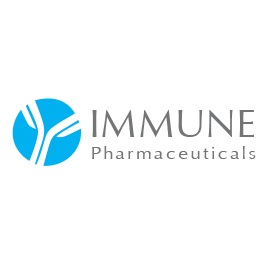
Immune Pharmaceuticals, a clinical stage biopharmaceutical company, announced that patient enrollment in a phase I/II clinical trial evaluating the safety and efficacy of Ceplene (histamine dihydrochloride) in patients with Chronic Myelomonocytic Leukemia (CMML) is expected to begin in the coming weeks. In this trial, 15 adult patients with CMML will receive Ceplene in conjunction with low-dose Proleukin (interleukin-2 (IL-2)).
This Ceplene/CMML trial is being financed by the University of Gothenburg, Sweden. Cytovia Inc., Immune's immuno-oncology subsidiary, has agreed to provide a non-restricted grant to the University of Gothenburg to cover costs for IL-2 treatment.
Dr. Daniel Teper commented, "Now that Cytovia has regained worldwide ownership of Ceplene following the transaction with Mylan, we have the opportunity to implement a comprehensive development and commercialization strategy for Ceplene. Chronic Myelomonocytic Leukemia represents a new indication for Ceplene, which fits in well with our strategy to develop new indications beyond Acute Myeloid Leukemia (AML) and to generate new intellectual property covering Ceplene's use."
"CMML cells exert immunosuppression that is targeted by Ceplene," added Professor Kristoffer Hellstrand, MD, PhD, at the Institute of Biomedicine, University of Gothenburg, Sweden. "By reducing immunosuppression, Ceplene improves the function of anti-leukemic immune cells, including T cells and natural killer (NK) cells."
CMML is a chronic form of leukemia characterized by the accumulation of leukemic monocytes in bone marrow and blood. The Leukemia & Lymphoma Society has estimated that CMML affects approximately three in 100,000 individuals or approximately 10,000 patients in the United States each year. Patients with CMML are at high risk for developing AML. The median survival time of CMML patients is estimated at 15-20 months, and there is a significant need for efficacious treatments.
Ceplene, in combination with low-dose Proleukin (interleukin-2 (IL-2)), has been approved in over 30 countries in Europe and in Israel for the treatment of AML for maintenance of remission and prevention of relapse of leukemia. For the vast majority of AML patients there is currently no other approved therapy to prevent relapse.
Ceplene, patients, chronic myelomonocytic leukemia